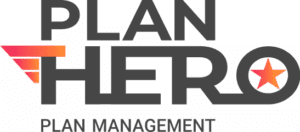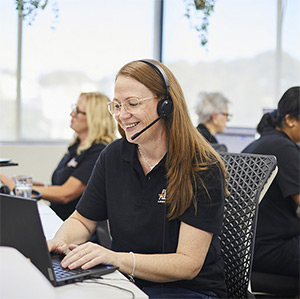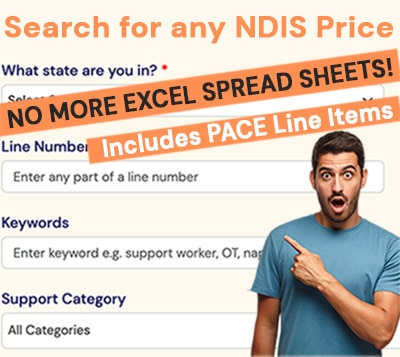Latest updates October 2025
It has been 12 months since the NDIS released the ‘in’ and ‘out’ support lists that turned everyone’s NDIS lives upside down.
Since then, there have been a lot of clarifications via the Section 10 FAQ and finally with the comprehensive Therapy Guidelines released this month which provide very specific information about the types of therapy the NDIS will and won’t fund.
So, let’s find out what therapy the NDIS will and won’t fund PLUS tips from a Plan Manager perspective on how ot make sure your therapy invoices can be paid.
This resource includes:
- Therapies the NDIS will fund
- Therapies the NDIS won’t fund
- A Plan Manager’s perspective: Therapy Invoices
- Therapy Prices
Therapies the NDIS will fund
Here is a description of each therapy the NDIS will fund and who must deliver it for it to be funded:
Art Therapy
Supports emotional regulation, self-awareness, and communication through creative expression (painting, drawing, dance, sculpture).
Focuses on the process (counselling), not the final product (the artwork), so is different from art lessons.
Art materials are included in the session cost.
For Example: helps people with cerebral palsy and autism improve functional skills and independence through culturally appropriate, family-based sessions.
Who can deliver it: Professional member of ANZACATA with a master’s degree in art therapy.
Audiology
Helps maximise hearing and balance functions through counselling, hearing aids, aural rehabilitation, and assistive technology.
Includes tests and treatments for hearing loss, tinnitus, and vestibular issues.
Who can deliver it: Certified Audiology Australia Accredited Audiologist (AudA) or full member of the Australian College of Audiology (ACAud).
Counselling
Provides a safe, structured space to manage emotions, build resilience, and set goals.
Supports people adjusting to disability or learning communication and coping skills.
For Example: Can help build the confidence needed for social skills and friendships.
Who can deliver it: Member of the Australian Counselling Association (ACA), Psychotherapy and Counselling Federation of Australia (PACFA), or provisionally registered psychologist under AHPRA.
Animal-Assisted Counselling
Counselling can include a therapy dog for comfort if no extra fees are charged.
For Example: Paul is autistic and has asked for therapy supports to help him build his skills to have conversations with his friends. Paul feels nervous about talking with a counsellor, especially about his friendships and the skills he wants to improve. He wants to work with a counsellor who includes a therapy dog in their sessions as he thinks this will make it easier for him to feel relaxed. He finds a counsellor who uses a therapy dog. This helps Paul to relax, regulate his emotions and talk to the counsellor without feeling anxious during therapy.
The NDIS will fund animal-assisted counselling therapy for Paul because it meets the NDIS funding criteria. It will help Paul increase his skills in areas related to his disability. For Paul, who has some difficulty with social communication, funding a counsellor will help him improve his skills to make and keep friends. The counsellor can include a therapy dog to help them work with Paul if they don’t charge him any additional fees for using the dog.
Developmental Education
Builds independence, life skills, and emotional regulation—often for children or teens with developmental or acquired disabilities.
Can help with transitions (e.g., leaving school) and self-advocacy.
For Example: helps young people prepare for high school with organisation, social, and planning skills.
Who can deliver it: Bachelor’s degree or higher; full member of Developmental Educators Australia Incorporated (DEAI).
Dietary Support
Helps manage diet and eating needs related to disability.
Dietitians create safe, personalised mealtime plans and swallowing strategies, review nutrition, and ensure food safety.
Who can deliver it: Accredited Practising Dietitian (APD) with Dietitians Australia.
Exercise Physiology
Develops clinical exercise programs for disability-related physical needs.
Helps maintain muscle strength, balance, and function, improving independence and reducing need for support workers.
Who can deliver it: Accredited Exercise Physiologist (AEP) with Exercise & Sports Science Australia.
Music Therapy
Uses music to improve emotional regulation, memory, coordination, and communication.
Focuses on therapeutic benefits of music and includes activities like singing, music-making, or songwriting.
NOTE: This is different from music or singing lessons that are not delivered by a qualified therapist and are focussed on enjoyment rather than herapeutic benefit.
Who can deliver it: Registered Music Therapist (RMT) with a university degree and registration through the Australian Music Therapy Association.
Occupational Therapy
Builds independence in everyday activities (home, school, work) through personalised strategies and equipment use.
Supports decision-making, organisation, and safety in daily tasks.
For Example: helps someone with a spinal injury develop transfer plans, safe routines, and adaptive equipment use.
Who can deliver it: AHPRA-registered Occupational Therapist.
Orthoptist
Supports people with visual difficulties (e.g., double vision, eye movement disorders, neurological vision issues).
Provides therapy, visual aids, and assistive tech advice to optimise vision use for daily life.
Who can deliver it: Registered with the Australian Orthoptic Board.
Physiotherapy
Improves or maintains movement, strength, and physical independence for disabilities like cerebral palsy, stroke, or spinal injury.
Uses exercise, manual therapy, carer education, and technology to prevent mobility loss.
Who can deliver it: AHPRA-registered physiotherapist.
Podiatry
Treats and prevents foot, ankle, and lower limb conditions, managing pain, mobility, and independence.
May prescribe orthotics or diabetic foot care plans.
Who can deliver it: Registered with the Podiatry Board of AHPRA.
Psychology
Supports emotional regulation, behaviour, and independence in daily life.
Helps with social skills, adjustment, and relationships related to disability.
Does not include mental health treatment, which is handled by the health system.
Who can deliver it: AHPRA-registered psychologist.
Rehabilitation and Vocational Counselling
Helps people with disability or chronic illness pursue work, study, and community goals through assessment, counselling, and service coordination.
Who can deliver it: Member of the Australian Society of Rehabilitation Counsellors (ASORC).
Social Work
Supports emotional and social wellbeing, using a holistic approach to adjust to disability and life changes.
Can include individual, family, or group work to build coping skills and improve quality of life.
Who can deliver it: Member of the Australian Association of Social Workers (AASW).
Speech Pathology or Therapy
Improves communication, language, and swallowing skills.
Helps with speech, listening, reading, writing, and alternative communication (e.g., AAC, symbols, sign language).
Also supports safe eating and drinking.
Who can deliver it: Certified Practising Speech Pathologist (CPSP) approved by Speech Pathology Australia.
Therapies the NDIS won’t Fund
Here is a list of therapies the NDIS will not fund:
Alternative and Complementary Therapies
Focus on unproven methods like cuddle therapy, crystal healing or aromatherapy that claim to balance energy but lack evidence for disability outcomes.
Animal Therapy
Includes animal-based activities (e.g. dog or horse therapy) that is used for enjoyment or social engagement.
This type of activity may fall under Community Participation funding instead. It it not allowed because the outcome is not a therapeutic benefit.
Note: Compare this to animal-assisted therapy where a qualified therapist may use an animal as part of their therapy.
For example, a psychologist or counsellor may use an animal in therapy sessions to assist a participant to calm, focus or regulate whilst the counselling/psychology session is undertaken. This would be the same as using a game or lego.
Energy and Health Practices
Covers lifestyle or fitness activities like weight loss or general exercise that aren’t directly related to disability needs.
Gym or Pool Memberships
NDIS may pay for support to help you access the gym or pool (like a support worker), but not entry or membership fees, which are considered personal costs.
Note: The NDIS will fund a personal trainer (under Health and Wellbeing supports) who may deliver their service at a gym, but they won’t fund the cost of joining the gym if needed.
Massage Therapy
Relaxation or remedial massage isn’t funded even if recommended by an allied health professional.
Massage therapists aren’t classed as allied health or therapy assistants.
Personal Training
General exercise sessions are not considered therapy.
Personal trainers may only be funded under Health and Wellbeing supports, not as therapy.
Social Group Programs
Recreational or educational group activities like Lego therapy, yoga, art, drama or music classes aren’t proven as therapy.They cannot be claimed from Capacity Building funds, but may fall under Social and COmmunity Participation funding (Core).
NDIS may fund support to attend but not the class cost.
Therapy in a Box
Pre-packaged kits or online programs that are not personalised, evidence-based or overseen by a therapist.
Wellness and Coaching Therapies
General wellbeing, motivation or lifestyle coaching programs that improve mood or health but aren’t linked to disability function.
A Plan Manager’s perspective: Therapy Invoices
Including the following information will make a Plan Manager’s job easy and your therapists will be paid quickly:
- Practice Name
- ABN
- Therapist Name and Qualification
- Therapy line item number (this is easy to find using the Price List search tool)
- Number of hours @ hourly rate
- Therapist travel line itme (if applicable) in a separate line. Find out how to calaculate your travel correctly here.
NOTE: Travel has a different line item number to therapy! - Do not include GST (this is a GST-free service for NDIS participants)
Therapy Prices
Use this NDIS Price List Search Tool to view the latest therapy prices



